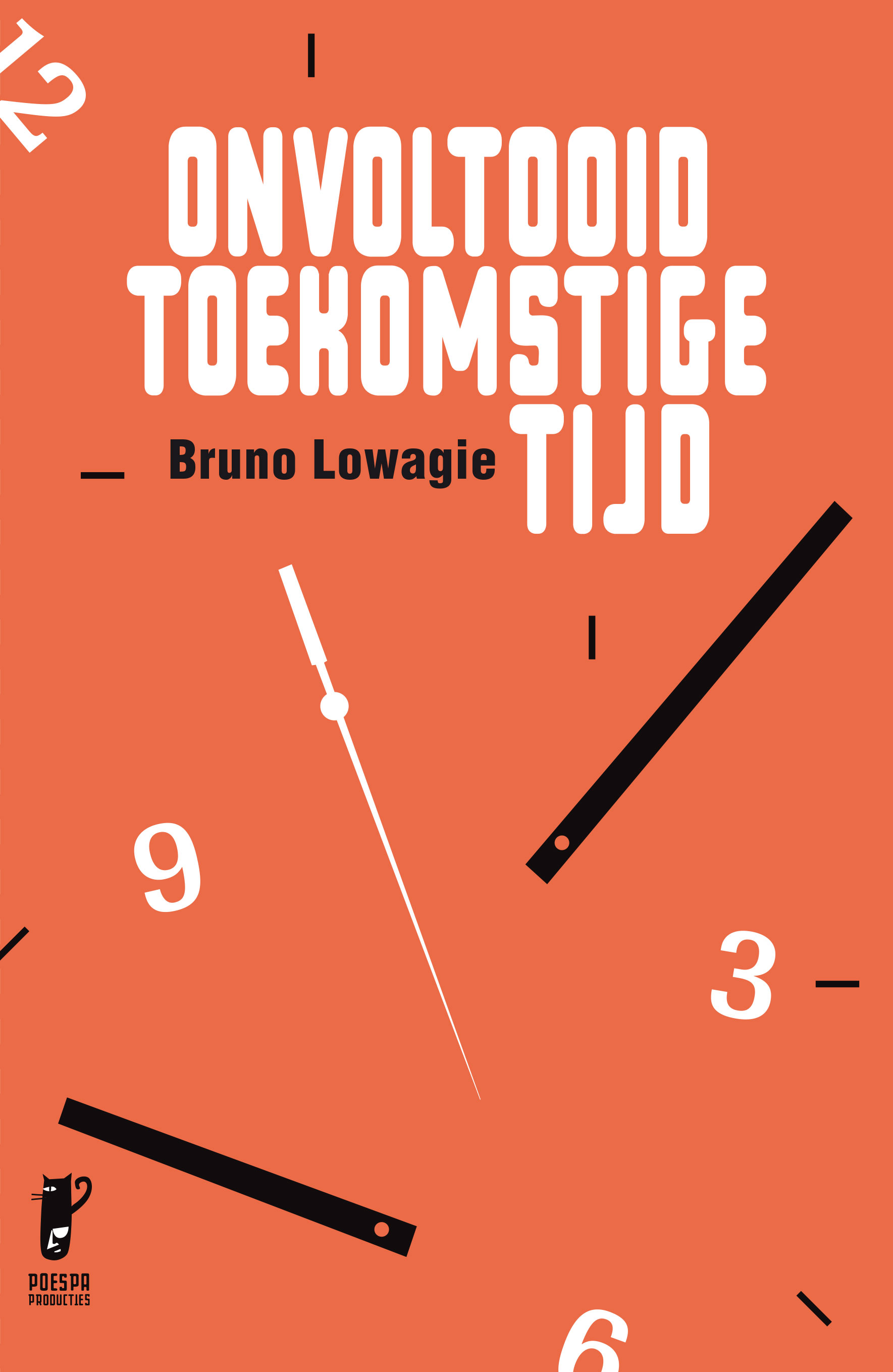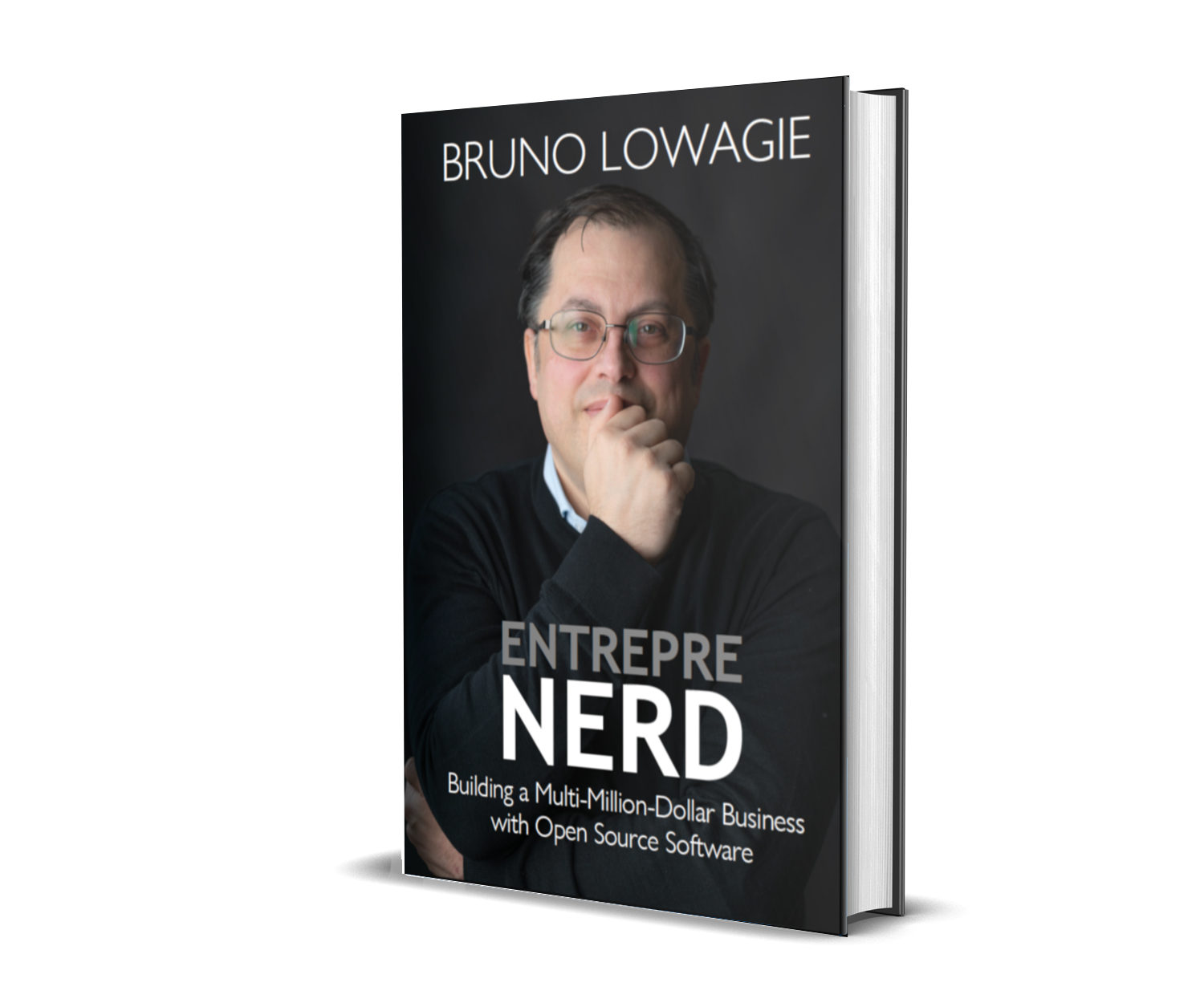2020-11-29
How not to find a publisher
Part 6: Self-Publishing
See also part 5: Publishers of Technical Books.
I look at writing the same way a professional athlete looks at his sport. You don't run a marathon without building up to it. I don't start writing a book without training my "writing muscle" first.
To prepare for the Dutch version of my personal memoirs, entitled "Gebeten" (literally translated: "Bitten"), I decided to write at least one short story a week for a while. As I'm a quite competitive person, I also set the goal of winning at least one literary prize in 2019.
In December 2018, I created an account on schrijvenonline.org, a Dutch web site for people who love writing. The site proposes a weekly writing assignment, which I completed for 52 weeks in a row. I also created a writing calendar, listing writing contests in The Netherlands and Flanders. At the end of the year 2019, I had won three first prizes, five publications in short story anthologies, three publications in a literary magazine, and eight other nominations. Did I already mention that I have a competitive nature?
CreateMyBooks.com
In May 2019, I followed an info-session by Creatief Schrijven about self-publishing. I was introduced to CreateMyBooks.com and I decided to experiment with this print-on-demand service. I created "Oceaanwees" ("Orphan of the Ocean"), bundling the "best" short stories I had written so far, and I uploaded this bundle to CreateMyBooks.
This resulted in a public release of my first self-published paper book on October 1, 2019. Initially, I was happy with the service, especially with the great support offered by the people at the help desk, but I discovered some disadvantages while using CreateMyBooks for the first test copies of "Gebeten".
If you wanted to create your own cover, you had to use an online tool that was hard to use and that crashed often. Once you had created a book and a cover, it was impossible to replace the content of that book, e.g. if you had fixed some typos. Finally, the price of a book was rather high. I paid 12.14 euro for one 140-page softcover copy (not including the 4.67 euro shipping cost and the 1.01 euro tax). I also had to pay for an ISBN-number separately. The service allows you to put your book in an online shop, ShopMyBooks.com, but that shop adds an extra fee on top of the production cost, which makes that people who buy a single copy pay even more than the total of 17.82 euro I paid for my first copy.
The poor functionality to create the cover and the extra fee that made the book more expensive in the online shop, were the main two reasons why I started looking for another service to publish "Gebeten".
Blurb.com
I found Blurb, and I decided to write yet another book to test the service.
In "Nijlpaard voor Kerstmis" ("Hippopotamus for Christmas"), I bring the story of the year my son spent in hospital after he was diagnosed with Cancer. I kept a diary that year, and I compiled that diary into a book to experiment with Blurb before publishing "Gebeten".
Blurb allows you to upload a cover in PDF, which is more user-friendly than having to use an online tool. You also don't have to worry about an ISBN number; Blurb offers one for free. Finally, there's the aspect of the price. I paid only 4.27 euro for a 168-page softcover copy. Unfortunately, Blurb's shipping cost for one copy is brutal: 10.99 euro for a single book (this cost may vary depending on where you live). Add the 0.92 euro tax, and the price is still lower than the price of a book ordered created on CreateMyBooks: 16.18 euro.
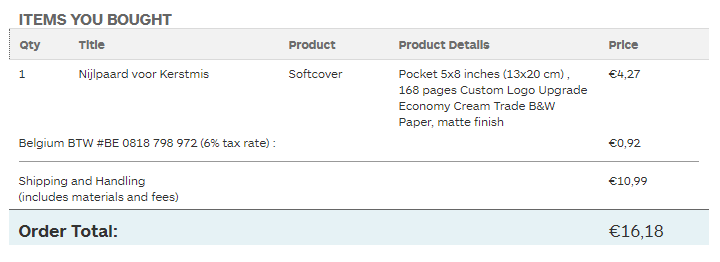
The more copies you order, the more significant the price difference becomes in favor of using Blurb. Both services offer volume discounts, but Blurb beats CreateMyBooks because the shipping price doesn't increase as fast as the price of the books. For instance: I recently ordered 100 copies of "Nijlpaard voor Kerstmis" and paid 410.11 euro; that's 4.10 euro per copy (after editing the book, the page count increased from 168 to 180 pages, mostly because I added images).
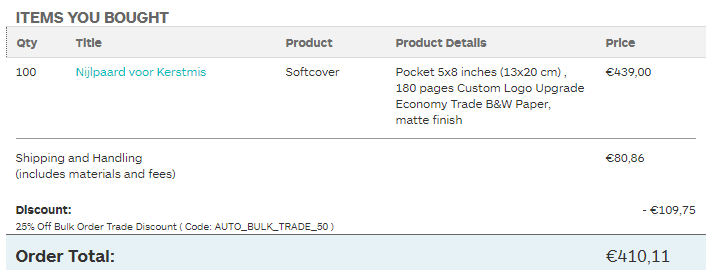
You don't find any tax on this invoice because I changed my personal account on Blurb into a business account, in which case no tax is due. The tax was added when I personally bought those 100 copies from my own company:

I donated these copies to two charity organizations in the context of an initiative called De Warmste Week. These organizations sell the books for 14.00 euro a copy (and they can keep the money). For every 4.20 euro I donate, they can make 14.00 euro.
The help desk at Blurb was also excellent, so I went ahead and published "Gebeten" with Blurb. As I opted for a hard cover version, the price per book was somewhat higher. I ordered the books in batches of fifty copies to benefit from a 25% "Bulk Order Trade Discount".
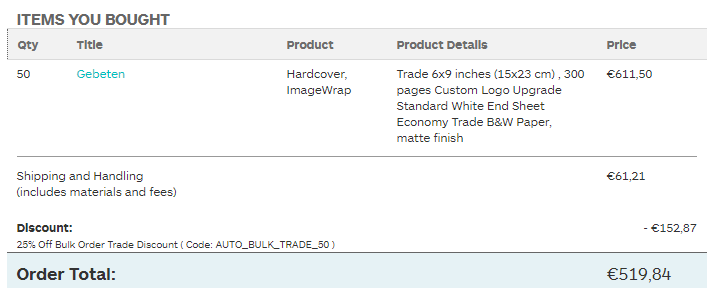
If you do the Math, you can see that I pay 10.40 euro per copy. I sell that copy for 23.64 euro. Packaging and shipping costs me 6.00 euro, and there's 6% tax on books in Belgium, which adds up to the round sum 30.00 euro for whoever buys the book from me directly.
For each fifty books I order, I start making a profit from the moment I succeed in selling eighteen copies at full price. I order a new batch every time my supply is almost depleted. So far, I have bought two-hundred copies in total; I still have twenty-three copies in stock.
Obviously I gave away copies for free to reviewers and family members. I also gave significant reductions to people who had helped me in the past, and to people who ordered more than one copy. Nevertheless, being an entrepreneur, I was obliged to make sure that my operation was profitable. That wasn't difficult with a margin of 13.24 euro per copy.
I am well aware that no publisher can match such a margin. When you publish a book with a publisher, a large part of the margin goes to retail, and you also have to take the extra investments by the publisher into account. I would have produced a much better book if I had a staff of people helping me in the process. I would also have sold more books, if I had invested in marketing —which I didn't.
If you're a publisher reading this, I hope you've noticed that I'm an extremely transparent, determined and professional person. I have one major flaw: I expect the same transparency, determination and professionalism from the people I work with. If you tell me that publishing my book is too high a financial risk, let's take a look at the costs together. Remember that I've been in business myself. I know how much it costs to hire people, and I'm certain that you can get better offers as a publisher than the deal I get from Blurb for printing a book.
Going through the full publishing process with "Gebeten" was a positive experience, but I noticed two major disadvantages:
- I really missed working in a team. I missed a developmental editor, a review manager, a copy editor, a proofreader,... To be successful, I also need people who disagree with me. If I have to self-publish "The Accidental Entrepreneur", the first thing I'm going to do, is hiring a copy editor.
- The distribution process was a pain. I processed all the orders myself. As soon as a customer paid his invoice, I personally packaged the book and brought it to the postal office. I know that I could have outsourced the logistics, but I wanted to gain firsthand experience.
Blurb offers two mutually exclusive ways to distribute your book. You can either offer it through Blurb's own online store; this is the option I use when someone outside Belgium wants to order the book. The other option is to have Blurb offer the book on Amazon. I didn't experiment with that option. I was going to, but then I learned about lulu.com.
Lulu.com
As you've noticed throughout this series of blog posts, I've been asking around for advice in my network. One of the most interesting suggestions I received, was provided by Nigel Lee.
In answer to my request for an introduction to a literary agent, he wrote: "(Censored name of a literary agent) and I are connected but I don't know her personally. I've spoken to a couple of friends in the space both of whom are overloaded at the moment. It seems there is a tremendous Covid created backlog of manuscripts battling to get in to the front catalogue of publishers. I got feedback from them both that autobiographical non-fiction in the technology space is highly niche and unless related to a household name tech company - most publishers would be reluctant to consider.
Bob Young is a dear friend of mine. I'm sure you know who Bob is, given your work in the open source arena. Bob wrote a book telling the Red Hat story called 'Under the Radar'. Despite it being about Linux and the breakthrough of Red Hat, not a single publisher would touch it. In the end Bob founded a self publishing company (Lulu.com) and independently published the book himself. Independent publishing is an area I know well. I was CEO of Lulu.com for some years, hence my relationship to Bob.
The self publishing route is lucrative if you're able to market the book yourself to your own audience. I read the extracts you sent me, they are well written. I would question, however, the potential audience size for such a title. I'm more than happy to help you out in any direction, but I'm afraid I've exhausted already my close contacts in the 'agent' space.
I wish you well with your project. Please let me know how you get on."
I visited the Lulu web site, and my first impression is that the price per copy is slightly higher than the price Blurb offers. I don't know anything about the shipping cost yet, but I read that there are a ton of different ways to distribute your book available, including offering it as an ebook (ePub, not PDF). That justifies experimenting with the service, despite the higher price per copy.
I'm eager to give this service a try, but I don't want to use "The Accidental Entrepreneur" for this test. That means that I'll have to come up with another book first.
I started this episode by referring to my "writing muscle". I explained how I wrote at least one Dutch short story a week for a full year. I did something similar to prepare for "The Accidental Entrepreneur". I created an account on Reedsy.com, and between January 7 and June 25, I wrote at least one English story a week in response to Reedsy's Weekly Writing Prompts. I also wrote short stories for the monthly Furious Fiction contest for several months in a row. This resulted in sixty (forty-four Reedsy and sixteen Furious Fiction) short fiction stories.
Obviously, not all of these stories are worthy of publication, but I'll make a selection of those stories I like most and I'll bundle them in a book entitled "Bad Hair". You can check my progress on my creative writing page. The stories with the colored background are the stories I've already edited —or that I'm currently editing. In case you start reading them online: please understand that some of these stories are bloated because Reedsy only allows you to submit them if they have a minimum of 3,000 words. After I edited them, most of the stories will be much shorter.
Conclusion
The feedback from Nigel Lee explains why I had such a hard time finding a literary agent or a publisher (and why my previous rants shouldn't be taken too seriously), but that doesn't mean I'm giving up already. By giving priority to experimenting with lulu.com, I am giving "The Accidental Entrepreneur" some more time to find a literary agent or a publisher.
I've been adding references to the LinkedIn profiles of some of the protagonists of my quest in the comment section of each episode so that they are aware that I'm writing about them. Note that I don't refer to them as antagonists. Maybe one of those people sees how determined I am to succeed, and decides to work with me after all.
If that's the case: make me an offer, and I'll be happy to take it into consideration!
Tomorrow, I'll explain what my book is about in the final episode of "How not to find a publisher".
Onvoltooid toekomstige tijd
Entreprenerd
Wintercircus
Blog
- 2026-01-25:
Waarom de Belgische meerwaardebelasting een ramp is voor de Belgische economie - 2026-01-22:
Verkeerd citeren, en hoe hierop te reageren - 2026-01-11:
De Marshmallow-politiek: Waarom herverdeling een recept voor armoede is




